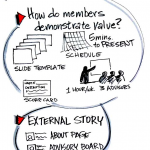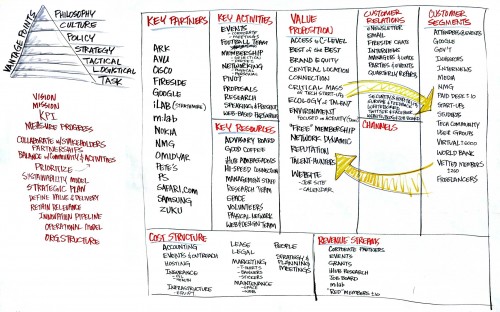This weekend the iHub Advisory Board met with the managers (Tosh and Jessica) to discuss the future direction of the space and what our focus should be for the coming year. The meeting was facilitated by my friend Peter Durand of Alphachimp Studios, who is in town as a part of the PopTech Lab.
The iHub Advisory Boards is made up of 5 people who come from the Nairobi tech community, and represent the community when important, or difficult, decisions have to be made. They are:
- Riyaz Bachani, Wananchi executive, now in charge of Wazi WiFi
- Josiah Mugambi, Co-Founder of Skunkworks, works at Nokia Siemens
- Rebeccah Wanjiku, Tech reporter and founder of Fireside Communications
- Conrad Akunga, Blogger, co-founder of Mzalendo and highly respected software architect
- Erik Hersman, Tech blogger and co-Founder of Ushahidi
Looking at 2012
Our overall focus has always been that we should look to serve the tech community first, and that everything else would come from that foundation. As we stepped back to look at what’s happened in the last (almost) 2 years, we tried to identify what worked and where there gaps were.
We first worked through the a “business model canvas”, putting our minds together to find out if we all saw the iHub in the same way, and if what we were doing was what we should be doing. As you can see in the diagram above, we tried to list out all of our partners and community members, then map how we add and receive value from each of them.
A key point of discussion was how do we add value to not just the 250 green members who can come in and use the space, but also the serve the needs of the other 6,000 white members in the “virtual” community. We’ll have more thoughts and announcements on this over weeks and months ahead.
Going Deeper by Improving Freelancer Skills
We delved deeper into this, separating the types of individuals between the startup types vs the freelance types. One of the biggest gaps we’ve found is that there are many freelancers, some of whom are working on a startup on the side, but need the funds from their freelance activities to pay the rent.
Our questions became:
- How does the makeup of the iHub green membership reflect different levels of what’s needed for projects to be done? In other words, are we diverse enough?
- How can we help get freelancers more projects?
- How can we help them become better at delivering on their projects?
In order to do freelance work, you often times have to team up with others who offer the skills that you lack. We’ve noticed that we’re primarily developers at the iHub, with some designers sprinkled in, but don’t have enough project managers or quality assurance types. So, our first order of business is to make sure we’re letting the people with these other skill sets know that they’re welcome to be a part of the iHub community too.
A gap that our sector has in Kenya is that companies who want to get a software project done don’t necessarily want to go with just any freelancer. We’ve discussed for some time the way the iHub brand can be used as a vector to find freelancers, but we’ve shied away from doing anything more than connecting people through the job board or through referrals.
The iHub is now looking into doing the following (and for this, we need some community feedback and help).
- Standardize a process for clients to interact with iHub freelancers, using the iHub brand as a vector for business needs to be solved by the technology community.
- Creating a way for developers, designers, project managers and QA people to collaborate and form teams to work on client projects. To be on the “shortlist” of freelancers, each would have to pass a test to make sure they are at the appropriate level.
- Bring in a very specific and targeted type of mentoring and business skill training to focus on the individuals in this program, so that we can get a better culture of on-time delivery, communications and quality of work.
- Put in place a system, upon project completion, for clients to rate the team, or individuals, who do the work. This would be tied to iHub member’s profiles, and anyone who under-delivers would be dropped from the pool of freelancers.
If you think you have the skills necessary to be on the initial shortlist for paid project work, and are a member of the iHub, let me or Tosh know as we think through this process. We’re looking for 5-10 people to explore this new area with us. Specifically, we’re also looking for a leader with great project management experience.
What YOU Do
As we stated at the beginning, the iHub is about doers not talkers.
 Our final takeaway was on communication by the green members on what they’re doing. To this end, we’ll be putting together a schedule for each of the 250 green members to do a 5-minute presentation, followed by a 5-min Q&A. There will always be a quorum of the iHub Advisory Board present, as they’re the ones who make the final decision on who gets and retains membership. It will also be in front of the other community members who would like to attend so that there is a better understanding in the community of what each of us do.
Our final takeaway was on communication by the green members on what they’re doing. To this end, we’ll be putting together a schedule for each of the 250 green members to do a 5-minute presentation, followed by a 5-min Q&A. There will always be a quorum of the iHub Advisory Board present, as they’re the ones who make the final decision on who gets and retains membership. It will also be in front of the other community members who would like to attend so that there is a better understanding in the community of what each of us do.
We’ll subscribe a very tight template, likely 15 slides that automatically progress, much like Pecha Kucha (or Ignite talks). You won’t be required to give up competitive details, this is more for you to give us an overview of what you’re working on, how the iHub is helping with that, and where the gaps are that you need assistance.
Look for more details on this in the near future, and be ready to sign-up for one of the slots. If you don’t do a presentation, you will lose your green membership.
Final Thoughts
The iHub has been operational for 1.5 years and we’re about to celebrate our 2 year anniversary in March. This cushion of almost 2 years has allowed us to do a lot of experimentation, and we’re still in the process of gathering feedback from the community to get a better understanding of how the iHub is doing and what we can do better.
As that information comes in, we’ll do what we always do, and that is double down on what works and throw out what doesn’t. It would help us greatly if you take part in this feedback process, run by Hilda Moraa out of the iHub Research arm.
Finally, a HUGE thank you to everyone who makes the iHub possible!


February 5, 2012 at 5:44 am
check on https://www.odesk.com/ for concepts on how to handle freelance work
February 6, 2012 at 2:25 am
Hash, great work! great progress! The Ihub is truly revolutionary – by global standards. Your vision is fantastic. Even sweeter is to know the Ihub is well run, with strong goals and a great team which makes things happen. The Ihub team is about doers! Glad to be associated with you. – Red Member in the Corner.
February 6, 2012 at 6:46 pm
Glad you like the business model canvas 🙂 its great to use for such sessions.
From looking at what is inserted- it also feels like there is a lot iHub is doing, some are obviously more intense than others- is iHub doing too much given the resources?
The freelance/startup problem is interesting- I also recommend setting up maybe a group odesk account (I have used it to source developers) and brand it the “iHub Developers/Freelancer” and set up a good profile of skills. -Maybe even explore a partnership with ODesk to help customize the billing (for pay out to developers in local payment options and for clients to pay in local methods too). Odesk (and other sites- e.g. 99designs is good for designers) is also a good way to benchmark global rates.
An internal certification that certifies the developers before you add them to a site like oDesk also makes sense, but it may not be necessary in the long-term- odesk has ratings, reviews and hours works which is a good proxy of quality in a similar way ebay sellers build up credibility over time.
To avoid paying a cut to oDesk- I woud consider building a platform long term that handles this, the advantage is that you could scale it out more. This same platform could then be used as a sort “iHub angel list”- so as an investor, I might fund a startup after seeing their projects they’ve freelanced before once list their new startup (especially with skills they have built up). Remember the biggest issue is credibility- collecting verified data on freelancers past work gets you a long way as far as getting better work AND or jumping into startup by proving you can build out products.
Exciting times and congrats for great work to date 🙂
February 9, 2012 at 2:51 pm
This is excellent thinking and I’m in no doubt of its necessity. We are very nearly at a point when we will be actively seeking to hire a team of Kenyan freelance coders. Coming from outside the country, with limited local connections, I can see we would have to rely heavily on personal recommendations. Therefore a search and rating system like the highly-regarded Angie’s List http://www.angieslist.com would seem like a good starting point. However, startups are all about teams, so ideally there would be a way to also rate teams/relationships that have worked well in the past.
I gave a talk at iHub last month about our Shadow Election project which we will be launching in Kenya (fingers crossed) by the end of the month. We will use the version run in the recent Finnish Presidential elections while we secure more resources to make some important improvements. As much as the business logic we are fully aware that developing a community is as important as developing code – and we feel that working with Kenyan coders on a nationally significant project should not only make them more motivated, but also more engaged with supporting the community we hope to create.
February 10, 2012 at 10:45 am
How will bloggers be tested?
February 16, 2012 at 4:53 am
It was an honor and an insight to witness firsthand the thoughtful, intelligent and grounded leadership represented by this group. I am back in The States now, singing the praises of the iHub community. My only problem is now that I have been infected by the electric white, green and red energy of iHubtopia and cannot wait to get back to the Silicon Savannah ASAP!
March 15, 2012 at 2:15 am
How did this event turn out?
July 30, 2012 at 9:01 am
I had always asked how other techies (network/systems admins) with project management skills could benefit from iHub and seems I’ve been answered with the Consulting program in place. Way to go fellow doers!!!!